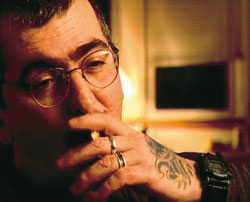AFTER O.J.
Court TV commissions indie filmmakers
Convicted killer Hugh Kelly.
ONE DIFFERENCE between American television and European television is American TV’s reliance on the concept of the brand. If French or German broadcasters are receptive to one-offs, independently acquired documentaries and the pre-buy of independent filmmakers, American TV tends to be so rigidly programmed around specific formulas — "20/20," "60 Minutes," "Behind the Music," etc. — that the shows seem to have emerged from some sort of computer simulator. But if one looks closer at current cable programming, one can find interesting filmmakers and offbeat points-of-view lurking behind the series titles. HBO, for example, has its "America Undercover" series, which is a compendium of docs, many produced in an independent fashion. And now there’s Court TV, which has quietly contracted an astonishing stable of independent doc makers to produce programming for its various umbrella programs — "Crime Stories," "The Wrong Man," and "Mugshots."
Lynn Kirby, Court TV’s vice president of development, mentions just some of the filmmakers the channel has made deals with. Robert Stone (Radio Bikini), for example, recently directed "American Babylon," the story of a vice detective who became a Baptist minister. Jonathan Stack (The Farm) is finishing "Big Easy Justice," a portrait of the law in New Orleans for a February airing. Mark Mori (Building Bombs) wrapped a show on convicted Atlanta child murderer Wayne Williams. Nanette Burstein and Brett Morgen (On the Ropes) are shooting two "Wrong Man" stories of the unjustly accused. David Van Taylor (Dream Deceivers) is finishing a doc on the Attica uprising. Liz Garbus and Rory Kennedy (The Farm, American Hollow, respectively) are creating PSA’s celebrating international human rights heroes. Randy Barbato and Fenton Bailey (The Eyes of Tammy Faye) are completing a history of punishment. And Derek Cianfrance (Brother Tied) is doing a program on crime photography.
Says Kirby, "Three things work well for us: well-told stories, quasi-mystery tales with cliffhangers or a whodunnit angle; biographies and portraits of bad guys or serial killers; and ‘inside’ shows, programs that take people to a place where they wouldn’t normally have access, such as inside a maximum security prison."
Court TV was launched in 1991, but the channel didn’t do much with independents until a couple of years ago, in the aftermath of the O.J. trial. Kirby explains, "O.J. really branded Court TV. But [after the verdict], it became clear that the channel needed to build on [the airing of] trials. We needed primetime programming to pull in some numbers. Independent filmmakers not only have great access to unique stories, but they also have visions. And we welcome edgy, stylistic stuff that distinguishes our air from our competitors."
Also notable is Court TV’s policy of making small development deals ($5,000 to $10,000) with filmmakers with specific program ideas. "For this we expect a tape and a developed outline or treatment," comments Kirby. "The most convincing demos aren’t just selects but scenes or sequences cut together so we can gauge the storytelling and talent of the filmmaker." In development are a slew of other projects: Beth B (Two Small Bodies) reporting on female terrorists; Offline Entertainment following a crime in Texas; Laurie Collyer (Nuyorican Dream) and Richard Stratton portraying ex-cons; and indie producer George LaVoo (Frisk, Getting to Know You) debuting as a director with a piece about a 30-year incarcerated killer, Hugh Kelly, who finds love while imprisoned.
Lavoo made contact with Kelly through a lawyer who represented him in his case to be discharged from the psychiatric ward and was soon sharing a steak with him in midtown. "He’s someone who has brutally killed and spent time in an asylum, so there’s no way you could not have a sense of trepidation meeting him. But he’s a great storyteller with a great sense of humor. And he’s very photogenic in a Sam Peckinpah kind of way." Working with d.p. Jim Denault (Boys Don’t Cry), Lavoo took Kelly back to visit his childhood home and psych-ward doctors. "Hugh is an articulate person who can talk about why he committed a horrible crime, and Court TV is interested in that insight." – Scott Macaulay
VOD CALENDAR


 See the VOD Calendar →
See the VOD Calendar →



